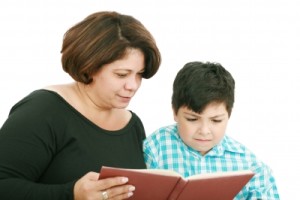Talking to Children About Dyslexia
Written by Sandie Barrie Blackley, Speech-Language Pathologist
Published on September 26, 2013
 Every day more than 50 people, mostly parents, administer our free, online Dyslexia Screener to their child. A lot of these parents end up calling us to ask what they should do next. We often end up talking about the importance of a complete evaluation, a diagnosis, and a clear treatment plan. Many parents also ask:
Every day more than 50 people, mostly parents, administer our free, online Dyslexia Screener to their child. A lot of these parents end up calling us to ask what they should do next. We often end up talking about the importance of a complete evaluation, a diagnosis, and a clear treatment plan. Many parents also ask:
“How should I talk to my child about this?”
It can be extremely difficult for a parent to see their very bright child struggle with reading and/or writing. And it’s also tremendously frustrating for the child.
Most people have the notion that all “smart” people can read well. But this is not supported by research. As we see every day, very smart people can have trouble with reading and especially with spelling. In many cases, this difficulty is caused by dyslexia, a neurobiological language processing difference. This can be hard for kids to understand!
To begin with, bear in mind that everyone has to learn to read. No one is born knowing how to read. Neither do children learn to read and spell the way they learned to talk–from exposure alone. Dyslexic readers and writers, in particular, often need a more intellectualized approach than is typically used in general education. Dyslexics need to thoroughly understand why words are spelled as they are. So, when we begin therapy with a child, we tell them that we are going to turn them into a word expert. By deeply understanding how words work, we know we can turn a weakness into a strength, and pain into joy!
Kids often ask their parents questions that they may not ask a teacher or a clinician. Kids often assume that if school is hard for them something must be “wrong”. So, they may ask, “What’s wrong with me? If your child asks this, let them know that there is nothing “wrong” with their brain. Thanks to recent research and modern brain imaging, we have lots of scientific proof that a dyslexic person’s brain is healthy but just works differently than do the brains of non-dyslexics. There is recent research that shows that, while dyslexics’ brains have weak language processing circuits, other brain circuits may have exceptionally strong connections. Research also shows that weak word circuits can be remarkably strengthened with the right kind of treatment. Further, we know that dyslexia is fairly common. According to the American Psychological Association, approximately 20% of people in the United States are affected by some degree of dyslexia. In many cases, dyslexia runs in families. If this is the case in your family, it may provide tremendous comfort to know it’s a family trait, just like the color of their eyes or hair.
When your child asks ‘what is dyslexia’?
When your child asks you what dyslexia means, it helps to be as direct and specific as possible. When you have dyslexia, your brain takes longer to make connections between speech sounds and the letters that represent them. Your brain may not be very aware of speech sounds and letter symbols. It may be hard to remember how letters are supposed to be pronounced and how to spell words. And, when your brain works this way, it can make everything about reading and writing harder, slower, and more exhausting.
‘What does having dyslexia mean for me?’
Fortunately, there are good ways to make reading and writing easier for a person with dyslexia. In addition to effective treatment, there are a number of technologies that can help. Children with dyslexia also need to explore their gifts. In fact, many dyslexics are capable of extraordinary thinking and creativity. This link on the Yale Center for Dyslexia and Creativity points out strengths to look for and point out in your dyslexic child.
Dyslexia can be scary, frustrating, and exhausting for both kids and parents, but with the right help, dyslexia can be overcome and the written word can be mastered.
Below are some books available to read to or with your child to help them understand dyslexia.
- “Tom’s Special Talent” by Kate Gaynor (for ages 5-9)
- “It’s Called Dyslexia” by Jennifer Moore-Malinos (for ages 8-12).
- “Dyslexic Brains Learn Differently,” written for children by children aged 10-13 years, with severe dyslexia.
- “Dyslexia: A Teenager’s Guide” by Sylvia Moody (ages 13-18)
If you are a parent looking for information on helping struggling readers, contact us directly at Info@Lexercise.com or 1-919-747-4557 or visit our website to learn more.
Improve Your Child’s Reading
Learn more about Lexercise today.
Schedule a FREE
15-minute consultation


